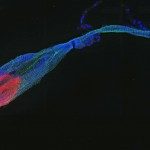Lien vers Pubmed [PMID] – 18093287
BMC Genomics 2007 Dec;8:466
BACKGROUND: The invasion of Anopheles salivary glands by Plasmodium sporozoites is an essential step for transmission of the parasite to the vertebrate host. Salivary gland sporozoites undergo a developmental programme to express genes required for their journey from the site of the mosquito bite to the liver and subsequent invasion of, and development within, hepatocytes. A Serial Analysis of Gene Expression was performed on Anopheles gambiae salivary glands infected or not with Plasmodium berghei and we report here the analysis of the Plasmodium sporozoite transcriptome.
RESULTS: Annotation of 530 tag sequences homologous to Plasmodium berghei genomic sequences identified 123 genes expressed in salivary gland sporozoites and these genes were classified according to their transcript abundance. A subset of these genes was further studied by quantitative PCR to determine their expression profiles. This revealed that sporozoites modulate their RNA amounts not only between the midgut and salivary glands, but also during their storage within the latter. Among the 123 genes, the expression of 66 is described for the first time in sporozoites of rodent Plasmodium species.
CONCLUSION: These novel sporozoite expressed genes, especially those expressed at high levels in salivary gland sporozoites, are likely to play a role in Plasmodium infectivity in the mammalian host.

